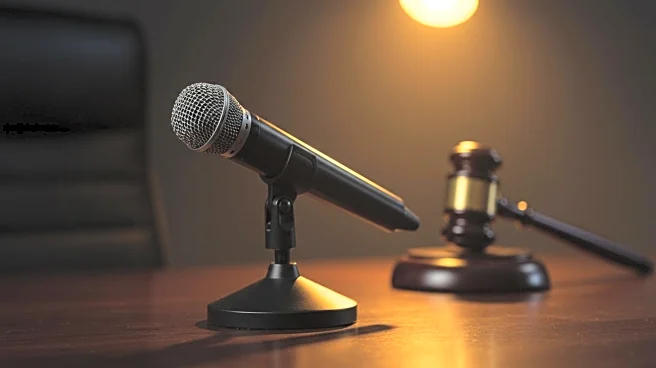What's Happening?
Kari Lake, a Trump administration official, has claimed to be the acting CEO of the Voice of America, despite legal questions surrounding her eligibility for the position. Lake, who has been serving as a senior advisor at the U.S. Agency for Global Media since March, stated in a court filing that she assumed the role of Acting CEO in late July. However, NPR reports that there is no public evidence of President Trump appointing her to this position, and former federal officials suggest she may not be eligible under U.S. law. Lake's actions, including significant workforce reductions at Voice of America, have sparked litigation, with a federal judge expressing concern over her adherence to congressional mandates and legal authority.
Why It's Important?
The controversy surrounding Kari Lake's role as acting CEO of Voice of America has significant implications for the legality of her decisions at the agency. If Lake's appointment is found to be unlawful, it could invalidate her actions, including the dismissal of hundreds of journalists and the reduction of language services. This situation raises profound legal questions about the governance of federally funded media and the adherence to statutory requirements for agency leadership. The outcome of this legal dispute could impact the operations of Voice of America and the U.S. Agency for Global Media, affecting their ability to serve as reliable news sources internationally.
What's Next?
The legal proceedings against Kari Lake and the U.S. Agency for Global Media are ongoing, with a federal judge overseeing related lawsuits filed by Voice of America journalists and press advocacy groups. The court will need to determine the legality of Lake's appointment and her authority to make significant changes at the agency. If Lake is found to lack the legal authority for her role, it could lead to further legal challenges and potential reversals of her decisions. The case may also prompt discussions about the governance and oversight of federally funded media organizations.
Beyond the Headlines
The situation with Kari Lake highlights broader issues of political influence and governance in federally funded media. It raises ethical questions about the appointment processes and the potential for political agendas to impact the operations of international news agencies. The case could lead to increased scrutiny of the U.S. Agency for Global Media and its adherence to congressional mandates, potentially influencing future policy decisions regarding media governance and international broadcasting.









